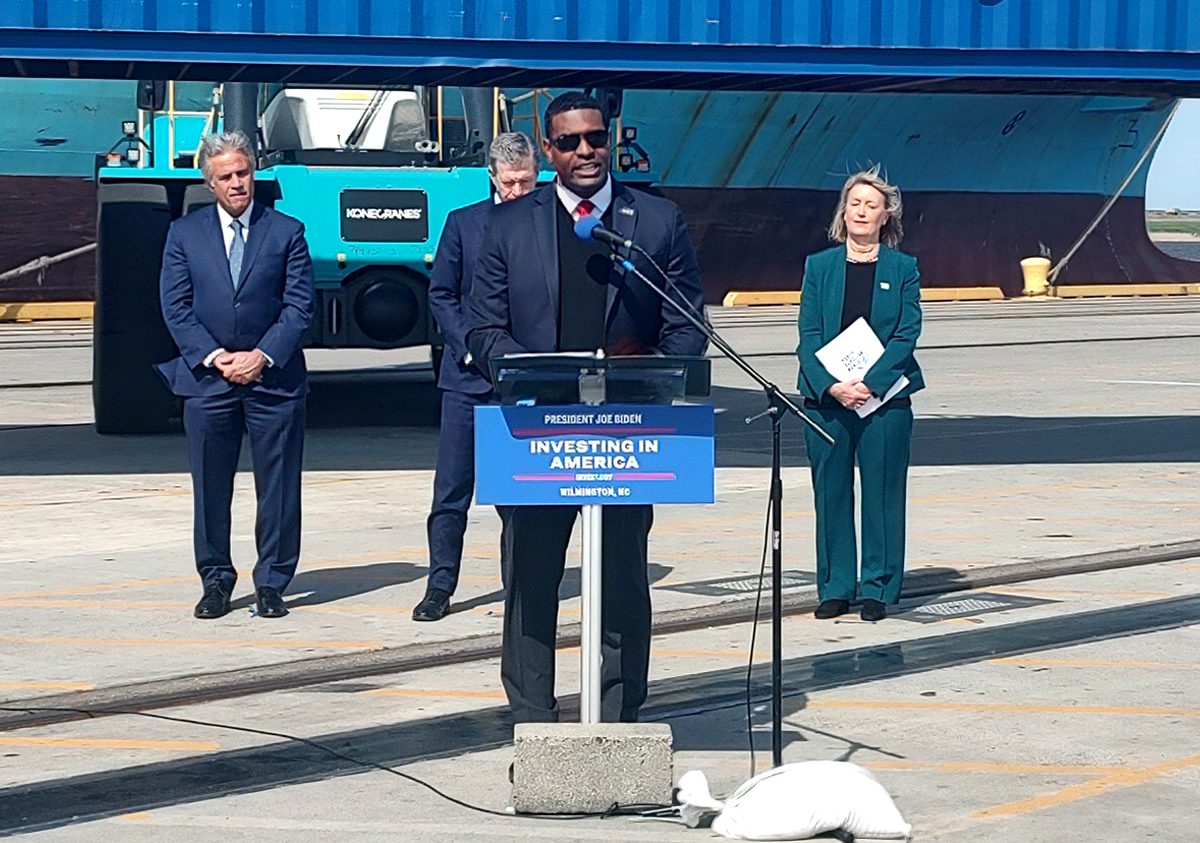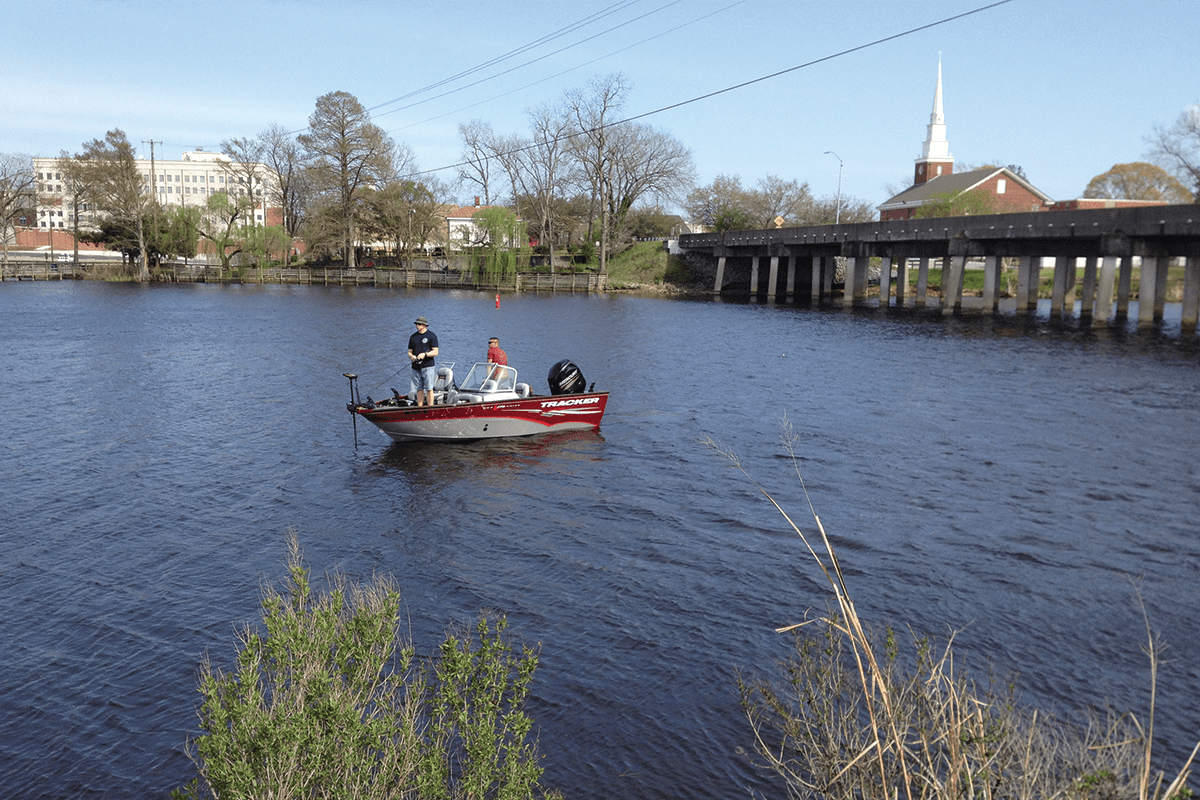
With a sizable cargo ship docked Wednesday at the N.C. Port at Wilmington on the Cape Fear River in the background, Environmental Protection Agency Administrator Michael Regan announced the launch of a federal program to improve air quality at U.S. ports.
Regan was joined by Gov. Roy Cooper, Wilmington Mayor Bill Saffo and North Carolina State Ports Authority Board of Directors Chair Susan Rabon at the morning press conference to announce the $3 billion Clean Ports program.
Supporter Spotlight
“Ports like this one right here in Wilmington are essential for commerce and are vital to our nation’s economic growth and supply chain infrastructure,” Regan said, adding that at the same time, many people residing near and around the nation’s ports are exposed to unhealthy air.
“So today, we’re proving once again,” Regan continued, that environmental protection and economic prosperity can go hand in hand. “And that’s why I’m excited to announce that EPA is launching our $3 billion Clean Ports Program.”
The funding through the Inflation Reduction Act that President Joe Biden signed into law in 2022, “will advance environmental justice by reducing diesel pollution from U.S. ports in surrounding communities, while creating good-paying jobs,” according to the EPA.
Regan said the money will go to purchase zero-emissions port equipment and infrastructure upgrades, while supporting both climate and air pollution-reduction strategies at all U.S. Ports.
“This program will lay the groundwork for transformational change by encouraging a transition to zero-emissions operations and reducing diesel pollution in and around our poor communities,” he said.
Supporter Spotlight
Regan said the EPA is releasing two notices of funding opportunities. The first pot of money includes $2.8 billion to facilitate the transition to zero-emissions equipment and infrastructure to reduce emissions nationwide. The second is close to $150 million for climate and air quality planning activities at ports to help build capacity for the ongoing transition to zero-emission port operations.
The announcement is more than just an investment in the economy, Regan said, “it’s an investment in President Biden’s pledge and commitment to environmental justice.”
Through the president’s investments “we are ensuring that those who live near ports can finally breath cleaner, healthier air. We are reimagining clean technology, and revolutionizing our nation’s port infrastructure, while addressing climate and environmental justice concerns.”
Before Regan spoke, Rabon of the ports authority board said the facility in Wilmington, the deep-water port in Morehead City and the inland operation in Charlotte, combined to support more than 88,000 direct and indirect jobs, and the work at the authority contributes $660 million annually to local and state tax revenues.
“Businesses need access to the global markets where their products are sold, and where their resources are found,” she said. “The authority provides that access making North Carolina ports are a key factor in our state’s phenomenal economic growth.”
Rabon added that while the ports authority is focused on growing business, “we’re committed to doing so in an environmentally conscious manner that preserves this area we are fortunate enough to call home.”
Gov. Cooper, during his remarks, described the Biden administration’s infrastructure policies as “generational.”
“We’ve been waiting for them for decades and now they’re finally here,” he said of the federal funding for roads, bridges, airports, rail and public transportation, high-speed internet, clean water systems and clean energy jobs. “And of course, our ports, will improve our state for decades and generations to come.”
The funding announced Wednesday means a cleaner work environment for those working at ports, will help make the communities around the ports cleaner and “will help us further our goals of environmental justice,” Cooper said.
Regan said after the announcement that the administration wants to get the money out as quickly as possible. “I feel very strongly that one $3 billion is a lot of money. There’s enough to go around. We’re going to see strong applications all across the country.”
EPA officials said the Clean Ports Program will help advance the Justice40 Initiative, which has a goal for “40% of the overall benefits of certain federal investments in climate, clean energy, and other areas flow to disadvantaged communities that are marginalized by underinvestment and overburdened by pollution.”
The agency said it has strived to ensure that near-port community engagement and equity considerations are program priorities. That focus has included evaluating applications on the extent and quality of community engagement efforts.
The nearly $2.8 billion Zero-Emission Technology Deployment Competition will directly fund zero-emission port equipment and infrastructure to reduce mobile source emissions at U.S. ports, according to the EPA.
Eligible uses of the funding include human-operated and maintained zero-emission cargo handling equipment, harbor craft and other vessels, electric charging and hydrogen fueling infrastructure, and a number of other technology investments. Applications are to be evaluated under multiple tiers in order to ensure that funds are distributed across ports of different sizes and types, and to ensure funding for ports serving Tribal communities, officials said.
The approximately $150 million Climate and Air Quality Planning Competition will fund climate and air quality planning activities at U.S. ports, including emissions inventories, strategy analysis, community engagement, and resiliency measure identification.
“Together, these opportunities will advance next-generation, clean technologies that will more safely and efficiently drive the movement of goods and passengers at our nation’s ports, a critical part of America’s supply chain infrastructure while reducing pollution and advancing environmental justice,” the EPA said in its announcement.
According to the Sierra Club, research has shown that diesel pollution contains more than 40 cancer-causing substances, including benzene and formaldehyde. The group cited links to asthma, heart disease and premature death.
“We continue to see vast clean transportation benefits moving out of the Inflation Reduction Act. Ports are a lesser talked about topic within the transportation sector – cleaning them up is crucial work,” Katherine García, director of Sierra Club’s Clean Transportation for All campaign, said in a statement. “This EPA program builds on the Department of Transportation’s ports program with necessary zero-emission investments that will bring significant health and air quality benefits.”







